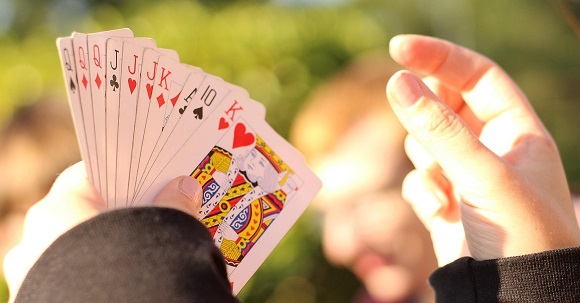
Doppelkopf, often called “Doko,” is one of Germany’s most beloved and strategic card games. Played widely in pubs, clubs, and tournaments, it combines clever partnerships, tactical trick-taking, and sharp memory skills.
Popular especially in northern and western Germany, Doppelkopf remains a cultural staple, connecting generations through competitive yet social gameplay. If you enjoy strategic card games with shifting alliances and subtle clues, learning Doppelkopf is both rewarding and fun.
History and Origins of Doppelkopf
Doppelkopf likely evolved in the 19th century from Schafkopf, a similarly complex trick-taking game popular in southern Germany. By doubling the deck and adjusting rules, players created a new dynamic focused on secret teams and nuanced strategies.
Over time, Doppelkopf spread across the country, with numerous local variants enriching its tradition. Today, the German Doppelkopf Association (Deutscher Doppelkopf-Verband) organizes tournaments and maintains standardized rules.
Equipment
Deck
- Two sets of 24 cards are combined, using only the 9, 10, Jack, Queen, King, and Ace from each suit.
- Total: 48 cards (4 copies of each rank and suit).
- Suits are Clubs (♣), Spades (♠), Hearts (♥), Diamonds (♦).
Card Ranks and Suits
In most games, the cards rank from highest to lowest in the following order (trumps first):
- Trumps (highest):
- Queens (in the order: Clubs > Spades > Hearts > Diamonds)
- Jacks (in the order: Clubs > Spades > Hearts > Diamonds)
- All Diamonds (Ace down to Nine)
- Non-Trump Suits:
- Ace (highest in non-trump suits)
- 10
- King
- 9 (lowest)
Game Objective
Players aim to form teams and score more points than their opponents, typically by winning tricks that contain valuable cards.
- Standard team goal: Collect more than 120 points combined.
- In special games (like Solos), one player competes against three others.
Seating and Deal
- Four players sit around a table.
- Dealer shuffles the 48 cards and deals 12 cards to each player, often in packets of 3-4-5 or 4-4-4.
- Deal passes clockwise each round.
Bidding and Declarations
After the deal, players have the opportunity to declare certain games or contracts.
Normal Game
- Partnerships are hidden: The two players holding the Queen of Clubs (“Die Alten”) form one team.
- The other two players form the opposing team.
- No verbal confirmation of teams is allowed unless forced by gameplay.
Solo Games
A player can announce a Solo game, in which they play alone against all three others. Types include:
- Trump Solo: Player chooses a suit as trump (Hearts, Clubs, or Spades).
- Grand Solo: Only Jacks are trumps.
- Queen or Jack Solo: Only Queens or Jacks are trumps.
- No Trump (Null) Solo: No trumps, aim to lose every trick.
Solo games must be declared before the first trick.
Gameplay and Rules
Trick-Taking
- Players must follow suit if possible.
- If unable to follow suit, any card can be played.
- Highest card of the suit led or highest trump wins the trick.
- The winner of the trick leads the next.
Special Cards and Hierarchy
- Top trumps:
- Queen of Clubs (highest trump)
- Queen of Spades
- Queen of Hearts
- Queen of Diamonds
- Jack of Clubs
- Jack of Spades
- Jack of Hearts
- Jack of Diamonds
- All Diamonds (Ace to Nine)
- Non-trump suits rank:
- Ace > 10 > King > 9
Recognizing Partnerships
- Players must deduce who their partner is during the course of play, based on card behavior.
- Holding both Queen of Clubs forms a “Hochzeit” (“wedding”), where the holder can pick a partner by winning a trick together.
Scoring System
Each card has a point value:
| Card | Points |
|---|---|
| Ace | 11 |
| 10 | 10 |
| King | 4 |
| Queen | 3 |
| Jack | 2 |
| 9 | 0 |
- Total points per deck: 240
- Winning threshold: 121 points for a normal win.
Bonuses and Penalties
- Schwarz (Black): Opponents win no tricks.
- Keine 90 (No 90): Opponents score less than 90 points.
- Keine 60 / Keine 30: Opponents score less than 60 or 30 points.
- Armut (“Poverty”): A special rule where a player with three or fewer trumps may ask for a partner exchange.
Example Bonus Points
| Bonus | Additional Points |
|---|---|
| Re (Re-announce win) | +2 |
| Kontra (Counter-announce) | +2 |
| No 90 | +1 |
| No 60 | +1 |
| No 30 | +1 |
| Schwarz | +1 |
Variations
Doppelkopf has many regional and house rule variations, such as:
- Five players variant: Four play per round, one sits out.
- Piglets (“Schweinchen”): Holding all Jacks or all Queens.
- Poverty (“Armut”): Special card exchange rules.
- Trump change: Allowing Hearts to become trump.
Before starting, players usually agree on the specific variant rules for their session.
Strategy Guide
Beginner Tips
- Memorize the card ranking order, especially trumps.
- Track how many trumps have been played.
- Watch how players react to lead cards to guess partnerships.
Intermediate Tactics
- Sacrifice small trumps to bait out stronger ones from opponents.
- Avoid revealing your hand strength too early by leading neutral cards.
- Help your suspected partner subtly without obvious plays.
Expert-Level Strategies
- Counting cards: Know what is left by mid-game.
- Strategic leading: Force opponents into unfavorable plays.
- Bluffing: Lead misleading cards to confuse and mislead.
- Solo calculations: Know when your hand is strong enough to declare a Solo.
Where to Play Doppelkopf Today
- Online Platforms:
- Doppelkopf Palast (mobile and browser)
- Doko-Online (competitive online Doppelkopf)
- Doppelkopf by Isar Interactive (mobile app)
- Local Clubs:
Many German towns and regions have Doppelkopf leagues and tournaments. - Tournaments:
Organized by the Deutscher Doppelkopf-Verband and local communities.
Related German Card Games
If you enjoy Doppelkopf, try:
- Skat: Germany’s national trick-taking game.
- Schafkopf: Bavaria’s traditional version of the game.
- Binokel: A classic Swabian game similar to Pinochle.
FAQs
Is Doppelkopf difficult to learn?
Basic rules are easy, but mastering tactics and team dynamics takes practice.
How many points are needed to win in Doppelkopf?
You need more than 120 points combined with your partner.
Can I play Doppelkopf online?
Yes, several platforms and apps offer free and competitive online Doppelkopf.
What is the most important skill in Doppelkopf?
Card counting and partner reading are critical skills for success.
Doppelkopf is a game of strategy, memory, and subtle communication. With its rich tradition, evolving tactics, and vibrant social culture, it remains one of the best German card games.
Whether you are a beginner curious about traditional games or a strategist looking for a mental challenge, mastering Doppelkopf is a journey worth taking. Grab a deck, gather some friends, and dive into a world where every card – and every trick – tells a deeper story.
To explore even more traditional games, check out our full guide on popular German card games.







